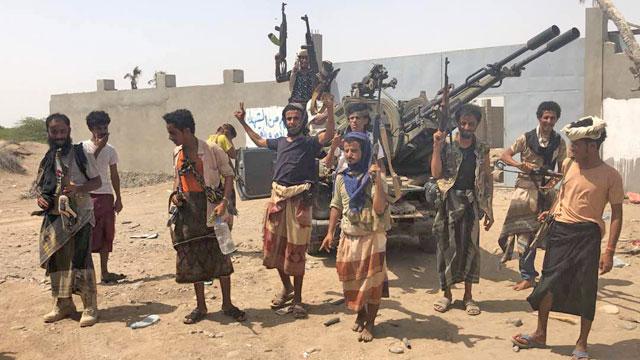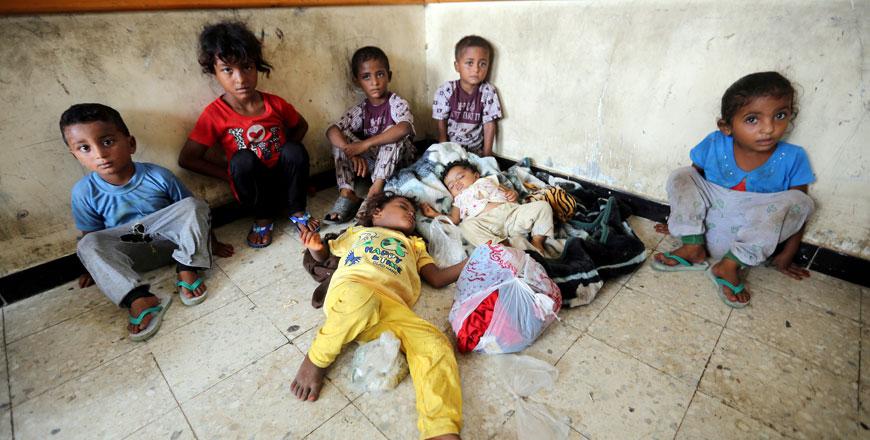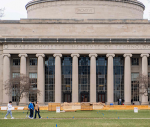You are here
As Hodeida battle grinds on, residents suffer lack of clean water, electricity
By Thomson Reuters Foundation - Jun 23,2018 - Last updated at Jun 23,2018

Yemeni fighters from the Amalqa (‘Giants’) Brigades loyal to the Saudi-backed government stand pointing their Kalashnikov assault rifles towards a Houthi-rebel banner painted on a wall, reading in Arabic ‘God is the greatest... Death to America, death to Israel, cursed be the Jews, victory for Islam’, on the southern outskirts of the Red Sea port city of Hodeida near the airport, on Thursday (AFP photo)
DUBAI — Residents unable to flee Hodeida face constant bombardment, lack of clean water and power cuts as an Arab coalition battles to capture Yemen’s main port from Iran-aligned Houthis in the biggest battle of the three-year war.
“We hear loud explosions all the time,” Assem Mohammed, a 30-year-old pharmacist, said by telephone. “We haven’t had water for three days.”
Mohammed, with his wife and six-month-old daughter, are among a dwindling number of residents who have remained in Hawak district, a neighbourhood sandwiched between the airport, captured this week by the coalition, and the sea port, the latest target of the military offensive.
Drivers transporting fleeing residents out of Hodeida have more than doubled their fares since the battle began, while the hospital where Mohammed works has threatened employees with dismissal if they are absent for long periods.
“Electricity has also been cut in most of the city since three days, and in some neighbourhoods for a week,” he said. He blamed the water shortage on damage to pipes that relief workers say has been caused by the Houthis digging trenches. Houthi officials could not immediately be reached for comment.
The alliance of Arab states led by Saudi Arabia and the United Arab Emirates launched its assault on Hodeida last week in an effort to cut the Houthi fighters who control the capital and most populated areas off from the outside world.
The United Nations fears that the campaign could cause a catastrophe in the country already undergoing the world’s most urgent humanitarian crisis. The port is the main lifeline for 22 million people who depend on aid, including 8.4 million on the verge of starvation.
“We’re seeing high levels of malnutrition on the ground,” Lise Grande, the UN humanitarian coordinator for Yemen told Reuters on Friday.
“Of the main issues we are concerned about, none is more significant right now than the possibility of a cholera outbreak,” she added. “We could see hundreds of thousands of people affected.”
Hodeida itself is home to 600,000 people more directly in the line of fire.
Since 2015, Hodeida residents have used privately-owned generators to produce electricity. But this month’s offensive has left them struggling to obtain the necessary diesel oil.
Temperatures during summer in Yemen soar to above 40oC in the shade, which along with lack of clean water could help spread disease.
The Arab states have pledged a swift operation to capture the Red Sea port without entering the city centre, to minimise civilian casualties and maintain the flow of essential goods.
Dozens of displaced families have been relocated to schools in the city, Mohammed Kassem, Hodeida system manager for the International Committee of the Red Cross, told Reuters as relief workers distributed food bags at one facility.
“We ran away only with the clothes we were wearing,” said one woman while waiting to receive her share.
The UN humanitarian coordinator estimated the number of displaced from Hodeida at 50,000 to 60,000. The World Food Programme (WFP) said that the upsurge in fighting could result in up to 1.1 million people being either displaced or trapped within Hodeida city and in need of emergency food assistance.
Two vessels carrying a combined 50,000 tonnes of wheat offloaded their shipment at Hodeida Port this week. A third carrying 25,000 tonnes of wheat is currently in a coalition holding area to berth in the port, WFP added in a statement.
UN alarmed
Grande warned against cholera spreading “with lightning speed” if the water system breaks down and nothing is done to immediately address the situation.
UN officials estimate that in a worst-case scenario the fighting could cost up to 250,000 lives, especially if a cholera epidemic occurs in the widely impoverished region.
The Arab coalition intervened in the war in 2015 to roll back Houthi control of Yemen’s main population centres and reinstate a government driven into exile. Coalition forces retook much of the south before the war, widely seen as a proxy conflict between Saudi Arabia and Iran, bogged down.
Some Hodeida families have fled the fighting for safety in the Houthi-held capital Sanaa, while others have headed to Raymah and Wusab, also in Houthi-ruled areas inland.
“They told us there’s an organisation where we can register as refugees over here, but God knows,” said Marwan Al Barah, displaced from Hodeida, queuing with other men at a school in Sanaa to register families for aid. Women sat on the floor in classrooms as barefoot children and toddlers played nearby.
Related Articles
ADEN, Yemen — Arab coalition troops stormed the airport in Yemen’s main port Hodeida on Tuesday and captured large areas of the compound in
SANAA, Yemen — Travelling by bus or taxi with children in tow, scores of mothers have fled fighting in Yemen’s key port city of Hodeida in r
Khokha, Yemen — Yemeni forces seized Hodeida airport on Wednesday in a major step towards retaking the rebel-held port city after a week of



















